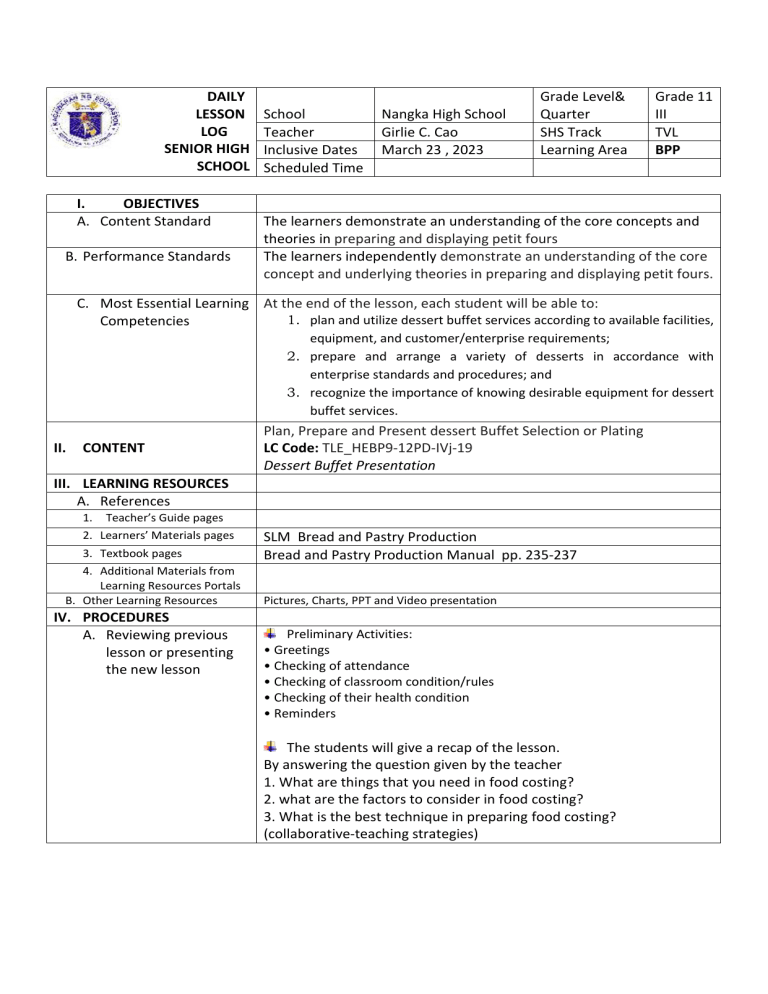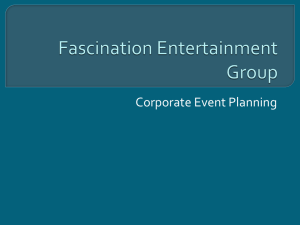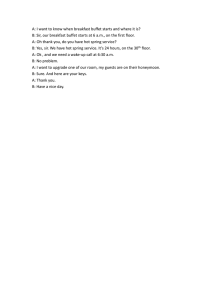
DAILY LESSON LOG SENIOR HIGH SCHOOL I. OBJECTIVES A. Content Standard B. Performance Standards School Teacher Inclusive Dates Scheduled Time Nangka High School Girlie C. Cao March 23 , 2023 Grade Level& Quarter SHS Track Learning Area Grade 11 III TVL BPP The learners demonstrate an understanding of the core concepts and theories in preparing and displaying petit fours The learners independently demonstrate an understanding of the core concept and underlying theories in preparing and displaying petit fours. C. Most Essential Learning At the end of the lesson, each student will be able to: 1. plan and utilize dessert buffet services according to available facilities, Competencies equipment, and customer/enterprise requirements; 2. prepare and arrange a variety of desserts in accordance with enterprise standards and procedures; and 3. recognize the importance of knowing desirable equipment for dessert buffet services. II. CONTENT Plan, Prepare and Present dessert Buffet Selection or Plating LC Code: TLE_HEBP9-12PD-IVj-19 Dessert Buffet Presentation III. LEARNING RESOURCES A. References 1. Teacher’s Guide pages 2. Learners’ Materials pages 3. Textbook pages 4. Additional Materials from Learning Resources Portals B. Other Learning Resources IV. PROCEDURES A. Reviewing previous lesson or presenting the new lesson SLM Bread and Pastry Production Bread and Pastry Production Manual pp. 235-237 Pictures, Charts, PPT and Video presentation Preliminary Activities: • Greetings • Checking of attendance • Checking of classroom condition/rules • Checking of their health condition • Reminders The students will give a recap of the lesson. By answering the question given by the teacher 1. What are things that you need in food costing? 2. what are the factors to consider in food costing? 3. What is the best technique in preparing food costing? (collaborative-teaching strategies) B. Establishing a purpose for the lesson Fill up the message: The students will solve the problem by filling in the message in order to know the topic for today. Buffet Presentation- A buffet offers all dishes from a selected menu in a single attractive setting. A buffet offers food service professionals the opportunity to exercise their creativity by identifying themes, and then creating menus, displays, and decorations with these themes in mind. C. Presenting examples/ instances of the new lesson (Concept Exploration) 1. Instruct the learners to read the objectives in “What I Need to Know”, and “What is it” on p.1-13 of Module 8- Bake bakery products according to techniques and appropriate conditions. 2. Tell them to answer the following activities in module a. What I Know-p.8 b. What’s New-p. 10 c. What’s More-p. 11 d. What I Have Learned – p.12 3. Let them compare their answers in the “Key to Correction” part of the module or the answers of students may also vary. (Experiential Engagement) Diagnostic Test: Note: Based on their answers, it is expected that the teacher can now identify the learners who have shown mastery of the competency and who will still need more guidance/instruction. C. Targeted Instruction 1. Remediation For learners who still need more guidance to master the competency, use the “Connecting Pictures strategy” wherein the students need to connect the pictures about the food costing 2. Reinforcement The teacher uses the video presentation. Let the students will make •Several words of mixing techniques in bread. •They will study the word and state what food costing is all about. 3. Enrichment The teacher employs the “jigsaw method” strategy. •Each group of 3 members will pick pictures. •Groups will be given a few minutes to create their conversation on how to prepare food costing. •Each group presents the output. -The teacher will present a PowerPoint presentation about Buffet dessert presentation. DID YOU KNOW? The term buffet originally referred to the French sideboard furniture where the food was served, but eventually became applied to the serving format. The word buffet became popular in the English-speaking world in the second half of the 20th century after the Swedes had popularized the smorgasbord in New York. The word is now fully accepted into the English language. Smorgasbord is a type of Scandinavian meal served buffet-style with multiple cold dishes of various foods on a table, originating in Sweden. BUFFET PRESENTATION TYPES OF BUFFET 1. CONTROLLED BUFFET-In this service servers are on the buffet line to serve food that is displayed 2. UNCONTROLLED BUFFET- is an array of foods that are designed to be small and easily consumed by hand alone, such as cupcakes, slices of pizza, foods on cocktail sticks, etc 3. FINGER TYPE BUFFET- In this service guest serve themselves from the display. FACTORS TO CONSIDER WHEN PLANNING A BUFFET There are several factors to be considered when planning a buffetMenuTheme(e.g: hawaiian luau, mexican, italian, carribbean,black and white formal dinner,chinese,seafood fiesta)Resources availableNumber of guest/customersNutritional needsNutritional Needs-have good offering of food and beverage with all nutrients. Consider nutritional needs of clients.Resources Available-consider equipment,overheads(utilities)purchase seasonal foods to minimize food cost Planning the Buffet The theme sets the tone of the event The theme will define the menu, decorations, props, linens, and dinnerwareThe theme can also define the music, lighting, and wait staff uniformsCan be accomplished for any meal period but lends itself best to lunches and dinnersELEMENT 1-PLAN A BUFFEt D. Discussing new concepts and practicing new skills #1 (photo of dessert buffet presentation) The students will identify the tools, materials and equipment needed in preparing buffet dessert presentation. Follow up questions: 1. What are those factors to consider in preparing a dessert buffet presentation? 2. How to plan, prepare and display a dessert buffet presentation? 3. How to design a dessert buffet presentation? 4. How to present dessert buffet presentation? Day 22 A. Reviewing previous lesson or presenting the new lesson Preliminary Activities: • Greetings • Checking attendance • Checking of classroom conditions/rules • Checking their health condition • Reminders The students will give a recap of the lesson. By answering the question given by the teacher 1. What is a buffet? 2. what are the types of buffets? 3. What is the best technique for preparing a buffet? (collaborative-teaching strategies) B. Establishing a purpose for the lesson Directions: Connect the dots to uncover this sweet summer treat. You Can uncover the summer treat by answering the following guide questions. 1. 2. 3. 4. 5. C. Discussing concepts and practicing new skills #2 D. Developing mastery (Leads to Formative Assessment 3) What is your favorite dessert? Did you know how they prepare your favorite dessert? How often do you have dessert? What dessert do you never eat? Can you prepare your dessert? How it is prepared? Demonstration The teacher will play a video on the demonstration of presenting and displaying a dessert buffet. Activity: to be answered in Quizalize Link Direction: Read and analyze the statement carefully. Write the letter of the best answer. 1. What is the final component of a plated dessert? a. crunch b. garnish c. main item d. sauce 2. What dessert component is the actual dessert itself? a. crunch b. garnish c. main item d. sauce 3. Which dessert component attributes in moist characteristics of dessert? a. crunch b. garnish c. main item d. sauce 4. Which among the following is an added component of desserts, and is essential for soft desserts like custards and ice cream? a. crunch b. garnish c. main item d. sauce 5. Which types of packaging materials include bamboo, banana, coconut, and cotton fiber? a. glass b. paper c. plastic d. vegetable fiber. E. Finding practical applications of concepts and skills in daily living Video Presentation: Sample Dessert Buffet Presentation Video Sources: https://www.youtube.com/watch?v=hEwip8j9Q1E&t=137s Follow-up questions: 1. What are things that you need to consider when presenting and plating cakes? 2. 3. Why is dessert one of the most important meals in every events? Why are desserts a popular attraction in buffets and dinners? Please answer the Assessment in your self-learning module on page 15 F. Making generalizations and abstractions about the lesson Have students make a generalization on the buffet dessert presentation. Fill in the blanks A buffet is a ___________________________ A disadvantage of buffet service is _______________ An advantage of buffet service is _______________ A buffet offers food service professionals the opportunity to exercise their creativity by identifying themes, and then creating menus, displays, and decorations with these themes in mind. G. Evaluating learning Performance Task Students will perform activity / Performance Task - Demonstration on buffet dessert presentation. In groups of four, using an assigned theme, plan and design a buffet menu Menus should reflect sufficient choices suitable for the occasion and very creative. Themes Group 1: “Under the Sea Experience” Group 2: Safari Theme Group 3: Butterfly theme Group 4 : Unicorn theme The students will evaluate their performance based on the following rubrics Rubrics for Scoring PRODUCTS 1. a. b. General Appearance Dish is attractive and appetizing Dish is pleasing to look at and with good color combination c. Ingredients are cooked just right. d. Dish has just the right consistency. 2. Palatability a. Dish is delicious b. Dish taste just right 3. Nutritive Value a. Dish is highly nutritious II. Procedures 4. Use of Resources a. The learner keeps the working table orderly while preparing the ingredients. b. The learner uses only the proper and needed utensils and dishes. c. The learner uses time-saving techniques and devices. 5. Cleanliness and Sanitation a. The learner is well-groomed and properly dressed for cooking b. The learner practices sanitary handling of food. 6. Conservation of nutrients VERY GOOD 4 GOOD FAIR POOR 3 2 1 a. b. Scale 4 3 2 1 H. Additional activities for application or remediation V. REMARKS The learner follows proper preparation and cooking procedures. The learner follows the recipe correctly. Description Excellent Good Fair Poor Points 93 – 100 86 – 927 79 – 85 78 – below (Learner’s Generated-Output) Please answer the Additional Activities on your self-learning module on page 16. Feedbacking tools: Please tick the appropriate box Agree Disagree Most of the competencies seemed relevant to me. The competency was at the right level for me. I got enough help from my trainer. The number of activities was sufficient. The competency allowed me to use my own initiative. My training was well-organized. My trainer had time to answer my questions. I was given enough time to practice. My trainer’s feedback was useful. Enough equipment was available, and it worked well. VI. REFLECTION A. No. of learners who earned 80% in the evaluation. B. No. of learners who require additional activities for remediation C. Did the remedial lessons work? No. of learners who have caught up with the lesson. D. No. of learners who continue to require remediation. E. Which of my teaching strategies worked well? Why did it work? ___ # of learners who earned 80% above ____# of learners who require additional activities for remediation YES _____ NO ___# of learners who caught up the lesson __# of learners who continue to require remediation _____ Experiment _____Collaborative Learning _____ Lecture _____ Role Play F. What difficulties did I encounter which my principal or supervisor can help me solve? G. What innovation or localized materials did I used/discover which I wish to share with other learners? Prepared By: GIRLIE C. CAO TVL SHS Teacher Noted by: JOVELYN M. BUHIAN Head Teacher III-TLE MARIA AMOR R. SOLIS Assistant Principal II HADJI M. TEJADA Principal II _____Differentiated Instruction _____ Discovery Why? _____ Complete Ims _____Bullying among pupils _____ Science / Computer/ _____ Pupils’ behavior / attitude Internet Lab _____ Colorful Ims _____ Unavailable Technology Equipment (AVR/LCD) _____Localized Videos _____ Making big books from views of the locality _____ Recycling of plastics _____ local musical composition



